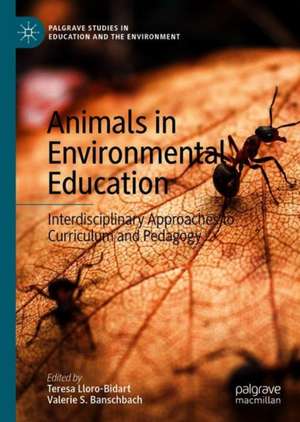Animals in Environmental Education: Interdisciplinary Approaches to Curriculum and Pedagogy: Palgrave Studies in Education and the Environment
Editat de Teresa Lloro-Bidart, Valerie S. Banschbachen Limba Engleză Hardback – 16 ian 2019
Preț: 951.59 lei
Preț vechi: 1160.48 lei
-18% Nou
Puncte Express: 1427
Preț estimativ în valută:
182.09€ • 198.41$ • 153.43£
182.09€ • 198.41$ • 153.43£
Carte tipărită la comandă
Livrare economică 23 aprilie-07 mai
Preluare comenzi: 021 569.72.76
Specificații
ISBN-13: 9783319984780
ISBN-10: 3319984780
Pagini: 283
Ilustrații: XIX, 270 p. 13 illus., 12 illus. in color.
Dimensiuni: 148 x 210 mm
Greutate: 0.62 kg
Ediția:1st ed. 2019
Editura: Springer International Publishing
Colecția Palgrave Macmillan
Seria Palgrave Studies in Education and the Environment
Locul publicării:Cham, Switzerland
ISBN-10: 3319984780
Pagini: 283
Ilustrații: XIX, 270 p. 13 illus., 12 illus. in color.
Dimensiuni: 148 x 210 mm
Greutate: 0.62 kg
Ediția:1st ed. 2019
Editura: Springer International Publishing
Colecția Palgrave Macmillan
Seria Palgrave Studies in Education and the Environment
Locul publicării:Cham, Switzerland
Cuprins
1. Introduction to Animals in Environmental Education: Whither Interdisciplinarity?.- Part I Intersectional Perspectives.- 2. What Can an Animal Liberation Perspective Contribute to Environmental Education?.- 3. An Intersectional Approach to Teaching and Learning About Humans and Other Animals in Educational Contexts.- 4. Intersectional and Interdisciplinary Approaches to Interspecies Food Justice Pedagogies.- Part II Posthumanism.- 5. Mutual Becomings? In Search of an Ethical Pedagogic Space in Human-Horse Relationships.- 6. Co-mingling Kin: Exploring Histories of Uneasy Human-Animal Relations as Sites for Ecological Posthumanist Pedagogies.- 7. Attending To Nonhuman Animals In Pedagogical Relationships and Encounters.- Part III Arts-Based Approaches.- 8. The Call of Wild Stories: Crossing Epistemological Borders with Narrative Fiction.- 9. On the Origin of the Dragon: Evolving a Transdisciplinary Research Pedagogy.- 10. Coexisting Entities in Multispecies Worlds: Arts-Based Methodologies for Decolonial Pedagogies.- Part IV Interdisciplinary Conversations in Formal and Non-Formal Education.- 11. Connecting Animal Cognition and Emotion with Ethical Reasoning in the Classroom.- 12. Putting Meat on the (Classroom) Table: Problems of Denial and Communication.- 13. Significant Life Experiences and Animal-Themed Education.
Notă biografică
Teresa Lloro-Bidart is Assistant Professor in the Liberal Studies Department at California State Polytechnic University, Pomona, USA.
Valerie Banschbach is Professor and Chair of the Environmental Studies Program at Roanoke College, USA.
Textul de pe ultima copertă
This book explores interdisciplinary approaches to animal-focused curriculum and pedagogy in environmental education, with an emphasis on integrating methods from the arts, humanities, and natural and social sciences. Each chapter, whether addressing curriculum, pedagogy, or both, engages with the extant literature in environmental education and other relevant fields to consider how interdisciplinary curricular and pedagogical practices shed new light on our understandings of and ethical/moral obligations to animals. Embracing theories like intersectionality, posthumanism, Indigenous cosmologies, and significant life experiences, and considering topics such as equine training, meat consumption and production, urban human-animal relationships, and zoos and aquariums, the chapters collectively contribute to the field by foregrounding the lives of animals. The volume purposefully steps forward from the historical marginalization of animals in educational research and practice.
Caracteristici
Explores ways interdisciplinary curricula and pedagogy uniquely capture animal voices Displays opportunity for students to explore the complex ways in which human and animal lives are entangled Asks how interdisciplinary curricula and pedagogy challenge (or rectify) the persistent anthropocentrism of traditional environmental education curricula and pedagogy









